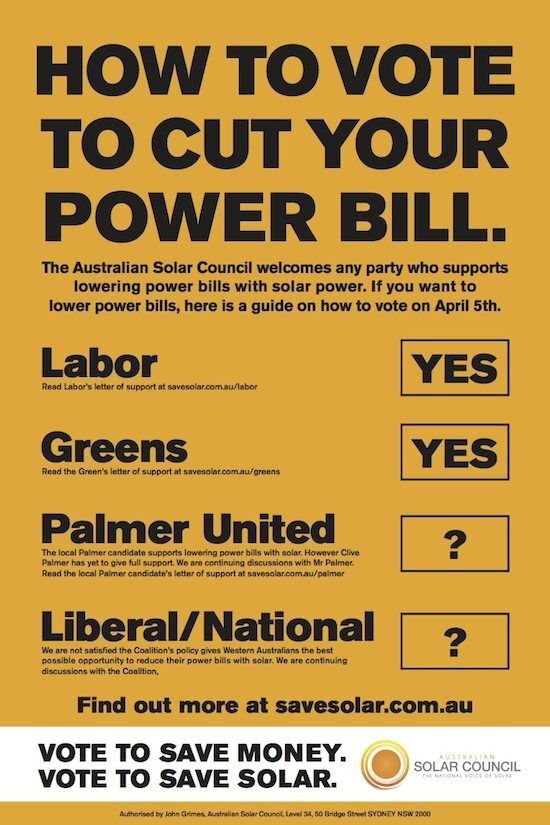The Australian Solar Council‘s campaign to keep the country’s Renewable Energy Target (RET) and its incentives for small-scale solar intact is now in full swing in Western Australia, with a media blitz that includes a television commercial, radio spots, newspaper & sky sign ads and social media messaging. The upcoming WA election–in which 3 Senate seats hang in the balance–is seen by Australia’s solar industry as a key battle in the fight to save the RET.
Solar Council chief John Grimes has been taking to major outlets, including the Australian, to spruik for the solar cause, aiming to drum up support among WA’s large solar constituency, which includes existing solar homes as well as potential future ones. Kept intact and undiluted, Mr Grimes says, the RET would facilitate another 350,000 people to switch on solar by 2020 in WA alone. On top of this, it would also see another 700MW of large-scale solar capacity installed in the state. Both the small-scale installations and the larger projects would support the local economy and provide jobs–with more than 7,000 between now and 2020 for the large-scale plants alone.
Mr Grimes said WA has a natural advantage when it comes to solar, thanks to its sunny climate. “Western Australia is among the top places in the world in terms of solar radiation. That means that for every dollar spent on solar the people of Western Australia will enjoy a disproportionately higher benefit than elsewhere in the world.” The Solar Council notes that denying WA residents access to the affordable solar power that has hitherto available would be unfair to those who have not yet made a decision; the status quo should remain, and a vote for a pro-solar party in the state could make a big difference. “This is the peak sales time for solar as householders take action to control their power costs, so it is the worst possible time for the federal government to scrap support for rooftop solar,” Mr Grimes said in a press release.
In one full-page newspaper ad, the ‘Solar Scorecard’, run across the state aimed at those who care about solar, voters are shown a stark choice between parties, with the title ‘How to vote to cut your power bill’. Referring to their support for the RET, the boxes for Labour and the Greens are each marked with a bold ‘YES’, while the Coalition and Palmer United parties have question marks next to them.

In the interview with the Australian, Mr Grimes said that final version of the ad will display a ‘NO’ next to the Coalition, explaining that the Coalition’s refusal to elucidate its vision for a 20% by 2020 RET does not inspire confidence. Nor does the government’s willingness to consider all options in its review of the scheme–including the option of eliminating the scheme altogether.
However, Mr Grimes says, the Palmer United Party will retain the question mark. While party head Clive Palmer has publicly come out against any binding RET, his party’s WA candidate Dio Wang has unequivocally expressed his support it to be kept as is, saying that a review would be ‘a waste of taxpayers’ money‘. Mr Wang’s support for the scheme, set against the background of his party’s generally pro-business stance could have some appeal to swing voters in the state. Ultimately, if only 2 of the 3 WA senate seats currently up for grabs end up going to the Coalition, this could make a difference for the future of the RET and send a clear message to the Coalition an anti-solar stance could be a political liability.
“Voters want to know which parties will help them slash their power bills by going solar,” said Mr Grimes. “Politicians know Australians love solar because it cuts household power bills. They know that supporting the Renewable Energy Target at the Senate election will deliver them votes. … Not supporting the Renewable Energy Target will cost them votes.”
© 2014 Solar Choice Pty Ltd